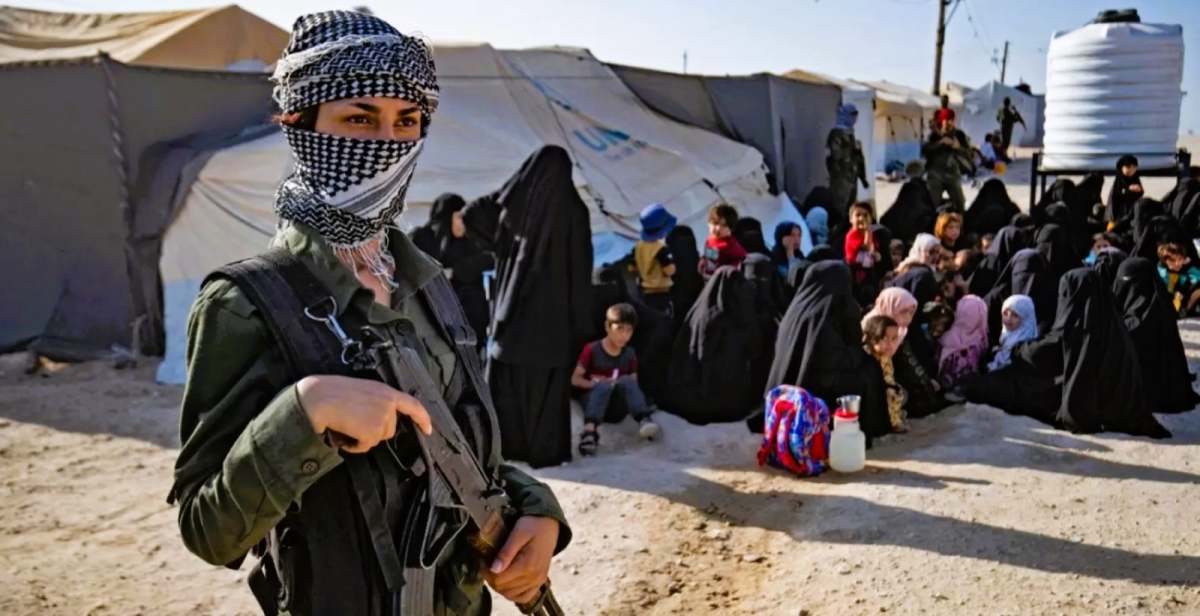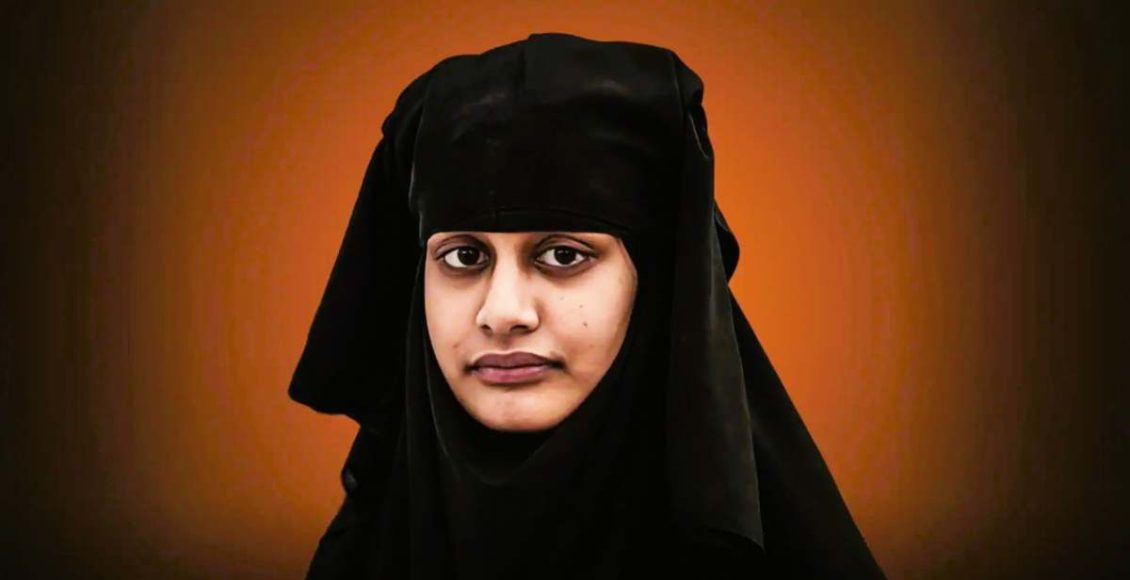Shamima Begum & Why an International Tribunal for ISIS is Necessary
By Theo Mitchell
At just 15 years-old, Shamima Begum left her home in London with two friends to travel to the Islamic State (IS). They would be smuggled through Turkey by a Canadian spy, where the three girls would be married off to foreign fighters. Two are presumed dead, and the survivor, Shamima Begum, ended up in a North-East Syrian refugee camp under the control of the Syrian Democratic Forces (SDF) alongside thousands of former ISIS fighters and their families following the demise of their ‘Caliphate’.
Following this discovery, Begum was stripped of her British citizenship and barred from ever returning to the United Kingdom, effectively making her stateless and exiled in North-East Syria (commonly called Rojava) alongside tens of thousands of other Islamic State members. These former ISIS members and their families now inhabit a precarious existence in vast tent cities such as Al Hol, which are, in practice, run by Islamic State women. Shamima Begum’s case illustrates a wider trend among the international community of refusing to take back their ISIS fighters and supporters who travelled to Iraq and Syria. This article will therefore argue the critical importance of establishing an international tribunal for ISIS members, as has been called for by the Democratic Autonomous Administration of North and East Syria (DAANES).
Who is Shamima Begum?
Shamima Begum was born in London to Bangladeshi parents and was raised in a religious household. Her friend, Sharmeena Begum (no relation), would leave for Syria first in 2014, describing it to Shamima as an Islamic Utopia and saying the ultra-violent videos put out by the Islamic State were fakes. Sharmeena, who would later recruit Shamima and two other girls to join ISIS, was allegedly radicalised at the East London Mosque in Whitechapel. So it was that Shamima Begum would be smuggled into Syria through Turkey, then a conduit for ISIS travellers and, according to many, a strategic partner of the Islamic State.
In Syria, her activities are less certain. British media reported that Shamima Begum was part of the Al-Khansaa Brigade, an all-female division of the ISIS ‘morality police’ responsible for upholding the Islamic State’s strict laws, overseeing ‘brothels’ of Yazidi slaves, and giving punishments including floggings and allegedly killing those who violated the ‘Caliphate’s’ laws. For her part, Shamima has denied this, saying she was just a housewife. What is known is that she and her husband, who was arrested by ISIS on suspicion of being a Dutch spy, lived alongside an Egyptian, ‘Abu Qomra’, who was responsible for providing weapons to ISIS fighters and was known to be a violent person.
Later, during the Battle of Raqqa, Shamima and her husband fled the city to Deir ez-Zor, fleeing south as the Islamic State collapsed, until eventually her husband was arrested and Shamima ended up in Al-Hol camp. It was here that she was stripped of her British citizenship and where her third child would die. In 2024, the final nail in the coffin of her chances to return to Britain was applied when she lost her appeal against the revocation of her citizenship, leaving her effectively stateless and marooned in North-East Syria indefinitely.
The story of Shamima Begum is typical of foreigners who travelled to live in the Islamic State, as it is mixed with a lot of uncertainty. Following the fall of the Caliphate, BBC reporter Quentin Sommerville saw the destruction of vital evidence as the foreigners who joined ISIS burned and smashed the incriminating phones and USB drives, scattering them across the desert leading up to ISIS’s last stand in Baghuz. As a result, the question of responsibility is one that is extremely difficult to answer and uncover, particularly for IS women such as Shamima Begum. For male ISIS fighters, their responsibility as a direct part of the Islamic State organisation is clearer, but the specific crimes they may have committed are less so.
The challenge is even greater for ISIS women who were the wives of such fighters. It is plausibly deniable that some committed no crimes at all (other than going to be a part of IS in the first place). Women like Shamima Begum have a huge incentive to say they were no more than housewives, and without proper judicial procedures, it is near impossible to implicate or exonerate them such that justice is properly done. The second wider pattern Shamima Begum’s story typifies is the lack of responsibility and lack of care from IS travellers’ home countries.
Shamima Begum, who was born and raised in the UK (and, ultimately, radicalised there), was stripped of her citizenship and left effectively stateless; she is just one of tens of thousands of foreigners held in North-East Syria. According to Human Rights Watch this number is over 42,400, including 37,000 in the al-Hol and Roj camps where Begum has been held. There has been great reluctance from countries around the world to take back their citizens who have travelled to the Islamic State. Though small numbers have been repatriated, particularly orphaned children, the vast majority remain languishing in these North-East Syrian camps with no clear future. Their home countries refuse to take them back, nor are they assisting the DAANES in dealing with them in any way.

The Risks to Rojava and Beyond
This situation is not sustainable from a security perspective. Security in these camps has been delegated entirely to the SDF, which lacks the resources to manage these huge sprawling tent cities. This, combined with very limited international support, has created an environment of intense insecurity inside the camps, albeit one that has been slightly ameliorated by recent SDF sweeping operations to root out ISIS cells in Al-Hol.
In Al-Hol, the leading cause of mortality was crime-related deaths, alongside 30 other attempted murders in 2021 alone. Persistent lawlessness has led to armed groups—some are ISIS sleeper cells and some are simply extortion groups—operating with impunity. Targets are those believed to be spying for security forces, those who refuse to pay taxes to armed groups, and those who fail to follow the strict cultural-religious norms of the camp. Others are seemingly killed at random.
A hotbed of extremism, the Islamic State has maintained a growing presence in the camps, often led by IS women who remain radicalised. Even many children continue to support the Islamic State project after receiving indoctrination from their female parents, who stay with them. Born into the Islamic State, they know nothing else. Moreover, those who renounce ISIS get beaten or shot and the camp is a place where the SDF can only enter during raids or sweeping operations, outside of which the camp remains under the control of ISIS and extortion gangs. Such conditions have particularly had a negative impact on the camp’s thousands of youth, whom Save the Children have reported are no longer allowed to play outside thanks to the insecurity, have nightmares, have lost interest in going to school, and constantly struggle with the mental anguish of having no clear future.
The Need for an International ISIS Tribunal
The instability and issues with the camps are clear and well-evidenced, but what are the solutions? One solution posited by NGOs and the media is repatriation. The logic of repatriation is sound: while the DAANES does not have the infrastructure to manage all these prisoners, nor does its judicial system have the capacity to try them all, external states do—not just in the west but also in North Africa, where a significant number of foreign fighters come from. Within the context of a functional justice system, the guilt or otherwise of those who travelled to the Islamic State could thus be viably determined. This contrasts to the fate of the detainees in North-East Syria, who face either indefinite detention and exile without trial or the release without trial of those suspected of links to the Islamic State, with some even bribing their way out under reconciliation schemes.
This idea—to have a full repatriation of all foreigners in camps and prisons such as al-Hol—could theoretically improve the situation in NE Syria a great deal, but has two practical limitations. The first, simply, is that there is no desire for it among the parent countries of those who travelled to join ISIS. The stripping of citizenship of Shamima Begum is emblematic of this: countries around the world have absconded in their duties and are content to let their citizens languish. They have paid no attention to the security risks—including to themselves—and the humanitarian catastrophe created by the present situation. It is not enough to simply end this article by recommending repatriations if it is clear they will not happen. If states will not take back their citizens who travelled to join ISIS, marry its fighters, or live in its Caliphate, then another situation is urgently needed. The second issue with this approach is that, while it would allow justice for foreign ISIS members, it provides no solution to the tens of thousands of Syrian and Iraqi detainees that the Iraqi, Syrian, and DAANES governments all lack the resources to properly deal with.
Both of these issues are solved by an international criminal tribunal for the Islamic State, as has been called for by the DAANES. International criminal tribunals have been used in two major post-conflict situations in which there was genocidal violence, as there has been in the case of the Islamic State: the International Criminal Tribunal on Rwanda (ICTR) and on the former Yugoslavia (ICTY). Both were established to give justice to the victims of atrocities resulting from state failure because of the perceived low likelihood of these war criminals being prosecuted through national trials. Just as in the case of the Islamic State, crimes against humanity were the focus of the previously held international tribunals.
However, there are unique difficulties in the Islamic State case. ICTR only charged 96 individuals and ICTY just over 160, whereas dealing with the ISIS foreign fighters and members would require the trial of thousands. It would be a far more expensive, lengthy, and resource-intensive endeavour that would require the resources of the wealthier nations of the world to fund. Nevertheless, there is no other viable option given the refusal of the international community to repatriate their citizens. As mentioned, the strength of ISIS within the camps (and even within the prisons where male fighters are held) is such that they represent a ticking time bomb—one more “Breaking the Walls” campaign away from thousands of Islamic State fighters and their supporters being freed, as they very nearly were during the 2022 prison break attempt in Hasakah when hundreds of fighters successfully breached the walls of Al-Sina’a Prison.
Why has it not happened thus far? The main issue is the lack of political recognition for the DAANES. Holding an international tribunal in NE Syria (Rojava) would de facto confer legitimacy and recognition upon what is internationally considered a non-state, “Kurdish-led” rebel polity (even though the reality is that it is multi-ethnic and includes Arabs, Assyrians, and others alongside the Kurds). Consequently, international recognition has been continually stymied by Turkish state hostility towards the idea because of their own domestic suppression of Kurdish rights, with only the sub-state Catalan Parliament formally recognising NE Syrian autonomy.
Possible alternatives include holding the tribunal in Iraq or Europe, but these come with problems of their own. For example, Iraq maintains the death penalty and does not maintain international standards in its justice system and, as has already been made clear, European states have no intention of bringing ISIS fighters back home. This leaves NE Syria as the clearest candidate. The political consequences of this may be significant in terms of recognition of the DAANES, but such measures are long overdue. The SDF, alongside the YPG (People’s Protection Units) and YPJ (Women’s Protection Units), sacrificed over 11,000 of its soldiers to destroy the ISIS Caliphate and has built a system of governance based on bottom-up democracy that maintains popular support and legitimacy among the people of NE Syria.
Furthermore, the right to self-determination is a fundamental right under international law and it is only geopolitics and the strategic importance of Turkey that are restricting the DAANES from having the same level of recognition that the Kurds in the Kurdistan Region of Iraq have today. If the international community wants any sort of final closure on the dark Islamic State chapter, and if it wants to prevent the potential rise of a second Caliphate from within the camps, then it is time to change that and finally create an international tribunal for ISIS in NE Syria.




Comments are closed.